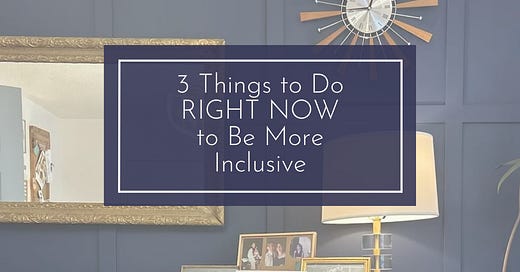3 Things You Can Do to Make Your Studio & Teaching More Inclusive
(do RIGHT NOW, in case it wasn't obvious)
I recently had a mahhhhhvelous time chatting with Marisa Lee Naismith about neurodiversity-affirming voice pedagogy and how to make our studios and teaching more inclusive for her podcast, A Voice & Beyond. In what will be a surprise to no person, we may or may not have been online together long enough to generate enough dialogue for a two-parter. I’ll send out all the alerts when the episodes land, of course, but I wanted to throw out these points that came up in the conversation while they’re fresh on my mind.
1. Update Your Intake Forms and/or Onboarding Process
This tip is a riff on the fabulous Liz Jackson Hearns’s famous, “what would you like me to do with that information?” question, and it’s a game-changer (Marisa literally stopped the conversation for several hot seconds to consider it … and there may or may not have been some “mind blown”s thrown out): ask this major question, "If you are incapacitated (for whatever reason) and cannot sing in our lesson, what would you like to have happen?"
Through a neurodiversity-affirming lens, you might ask this question so you understand what an autistic person would like to have happen if they have a meltdown in their lesson and cannot function in the way they would like to function in the lesson. Through an inclusivity-building lens, this question might apply to someone who is experiencing a panic attack, to someone who is completely overwhelmed, to someone who has a flare up from a chronic illness, or to ANY PERSON who cannot function in their lesson in the way that they would like to be able to function.
2. Normalize So-Called Accommodations
Any time someone asks for a change to the studio or the teaching, OR any time you offer one, rather than thinking of these changes as a ‘one-time’ change for a ‘special circumstance’, make it a point to normalize that change.
For example you might offer one or more of the following:
"I see you’re tired; would you like to lie down on the couch?"
"You seem to be high anxiety right now; let’s start with some breathing and grounding exercises."
“I’ll print these lyrics in a dyslexic-friendly font to make it easier for you to read.”
“Would you like to pace while you sing these exercises?”
And here’s how to normalize those offers: you notice that you offered a change (or “accommodation”) and you send an email to your entire studio that says something like, "Just had a session where a singer needed to have a lie-down halfway through, and it was amazing. Y’all know that this is an option for everyone at any time, and you don’t even have to ask, right?" Or, "Just had a session where a singer was highly anxious, so we did some grounding exercises. Y’all know that you can come in and ask for that, right? Because I trust you to know your body and what you need more than I do." Or, “Just printed off some lyrics using a dyslexic-friendly font to make it easier for them to read and realized that I can do that for EVERYONE so you can expect for everything to be easier to read from now on.” Or, “One of my students loved pacing during our session today; it helped them to be more focused and regulated. Y’all know that I LOVE movement in the studio, right? And that every person is welcome to move in whatever way they want to at any time they want to, right?”
3. Treat ‘Behaviour’ as Data
When a student says or does something that makes you think, "They’re so disrespectful," "They are so unmotivated," "They don’t know how good they have it," "They are so entitled," or "They never stay on track," do your best to observe that you are having that thought … and then get curious about those behaviours. Treat them as data, rather than as a personal affront.
Some questions to ask might be:
“What are they telling me when they never practice?”
“What do they need when they tell me that they don’t understand what I’m asking them?”
“What are they communicating when they don’t take advantage of something I am offering?”
Whaddaya think, friends? Anything coming up for ya? What would you add? How are you making YOUR teaching and studio spaces more inclusive?
xoxo Shannon
PS want more Neurodiversity-Affirming VoicePed? subscribe to The VoicePed 101 Library and get instant access to my Live Lectures (and accompanying resources & materials), Neurodiversity Primer, Neurodiversity in the Voice Studio, and Building Inclusive Voice Spaces.





